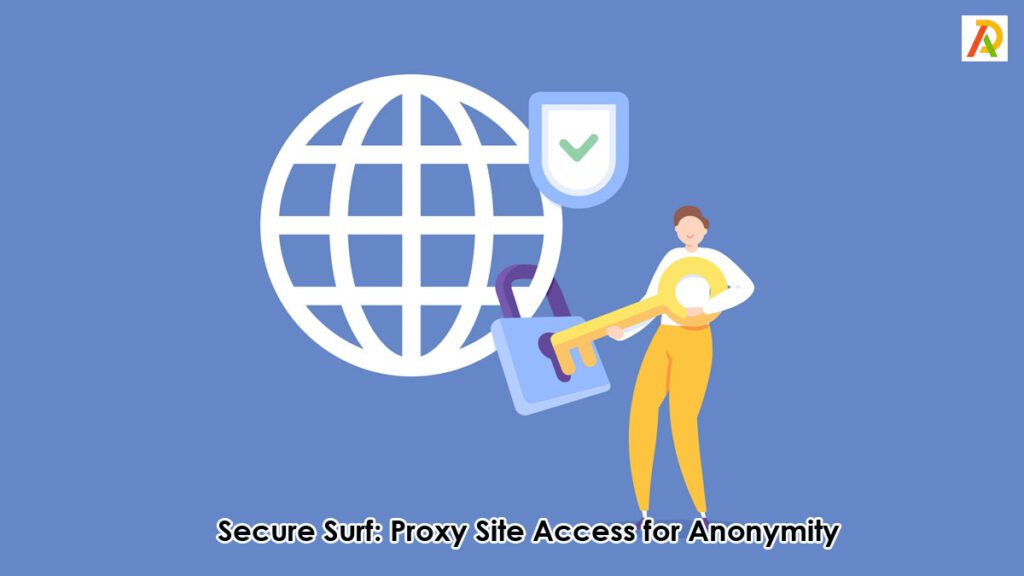Secure Surf: Proxy Site Access for Anonymity

In the rapidly evolving digital landscape, online access has become a necessity. Proxy sites have emerged as a powerful tool to navigate the constraints of Internet censorship and access restrictions. These virtual gateways offer users the ability to bypass geographic barriers and gain entry into websites that might otherwise be off-limits. This article delves into the intricacies of proxy site, exploring its functionalities and shedding light on its diverse applications.
Proxy Sites: Unlocking Digital Boundaries
A proxy site, also known as a web proxy or simply proxy, serves as an intermediary between users and the websites they intend to visit. Acting as a cloak, proxies hide the user’s IP address, granting them the capability to surf the web anonymously. Such a mechanism facilitates the circumvention of geographical and content-based restrictions imposed by governments, organizations, or network administrators.
Unblock Proxy: A Gateway to Restricted Content:
An unblock proxy epitomizes the essence of circumvention. These proxies excel in enabling access to websites that might be blocked by institutions, schools, or even countries. It reroutes users’ requests through servers located in different regions. An unblock proxy obscures the original location, allowing users to access content as if they were situated in an unrestricted location.
Free Proxy: Balancing Accessibility and Risks
The allure of free proxy services often beckons users seeking cost-effective solutions for unrestricted browsing. These services, available without monetary charges, grant users entry into the realm of blocked websites. However, free proxy comes with potential risks, including compromised security and privacy breaches. Users must exercise caution and choose reputable providers to mitigate these risks effectively.
Unblock Site: Breaching Virtual Barriers
An unblock site is the ultimate beneficiary of proxy services. Individuals in regions with stringent Internet censorship can utilize these unblock sites. They can access a plethora of information, educational resources, and entertainment content. Activists and journalists can leverage an unblock site to share suppressed information, fostering the free flow of knowledge in otherwise restrictive environments.
Proxy Sites vs. Virtual Private Networks (VPNs): Striking a Balance
While proxy sites offer a simplified method of bypassing restrictions, Virtual Private Networks (VPNs) provide a comprehensive approach to online security and access. Unlike a proxy site site, which primarily reroutes web traffic, VPNs encrypt the entire connection. They shield users from potential threats and surveillance. While a proxy site excels in granting access, VPNs offer a more holistic digital experience.
Why one requires a proxy server
A proxy server serves as an intermediary between a user’s device and the Internet. There are several reasons why individuals, organizations, and businesses might need to use a proxy server:
- Privacy and Anonymity: Proxy servers can hide the user’s IP address, making their online activities more private and anonymous. This is especially important when accessing websites or services that track user behavior for marketing or surveillance purposes.
- Access Control: People can use proxy servers to restrict or control access to certain websites or online content. Organizations often employ proxy servers to prevent employees from accessing inappropriate or non-work-related websites during office hours.
- Bypassing Restrictions: Many countries and institutions impose Internet censorship, blocking access to specific websites or content. Proxy servers located in unrestricted regions can help users bypass these restrictions and access blocked content.
- Circumventing Geographical Restrictions: Some online content, such as streaming services, is limited to specific geographic regions due to licensing agreements. Proxy servers can make it appear as though the user is accessing the Internet from a different location. It allows them to access region-restricted content.
- Enhanced Security: Proxy servers can act as a buffer between the user’s device and potentially harmful websites or content. They can filter out malicious content, malware, and phishing attempts, providing an additional layer of security.
- Faster Access: In some cases, a proxy server can cache frequently accessed web content. In this way, it reduces the load on the original website’s server and improves the overall browsing speed for users.
- Content Filtering: Organizations and academic institutions often use proxy servers to filter out inappropriate or harmful content. They guarantee a safer online environment for users, especially minors.
- Monitoring and Logging: Proxy servers can log user activity, which can be useful for monitoring employee behavior in the workplace. This also helps in troubleshooting network issues or conducting forensic investigations.
- Load Balancing: In a business context, proxy servers can distribute incoming web traffic across multiple servers. Thus, they can optimize resource utilization and prevent server overload.
- Data Compression: Some proxy servers can compress data before sending it to the user’s device. They can reduce bandwidth usage and improve the browsing experience, particularly on slow or congested networks.
- Anonymous Web Surfing: Proxy servers enable users to browse the Internet without leaving a trace on their local devices. This can be useful for maintaining privacy and preventing online tracking.
In summary, proxy servers offer various benefits, including enhanced privacy, access to restricted content, improved security, and network optimization. However, it’s important to use proxy servers from reputable sources. One should understand their potential limitations, such as security risks associated with certain types of proxies.
The criteria while choosing the best proxy browser:
Choosing the best proxy browser involves considering several criteria. You need to ensure that it meets your specific needs and provides a secure and reliable browsing experience. Here are some key criteria to consider:
Security and Privacy:
- Strong encryption: Look for a proxy browser that offers robust encryption to protect your data from being intercepted or monitored.
- No-logs policy: Ensure that the proxy browser does not keep logs of your browsing activity, which enhances your privacy.
- Reputation: Opt for well-known proxy browsers with a solid reputation for security and privacy, such as Tor Browser.
Anonymity:
- Anonymity features: The proxy browser should offer features that hide your IP address and make it difficult to trace your online activities back to you.
Ease of Use:
- User-friendly interface: A good proxy browser should be intuitive and easy to navigate, even for users who are not tech-savvy.
Speed and Performance:
- Fast Browsing: Choose a proxy browser that provides reasonable browsing speeds without excessive delays. This is because some proxy servers can slow down your connection.
Reliability:
- Stable connections: The proxy browser should maintain stable connections to ensure uninterrupted browsing.
Compatibility:
- Cross-platform support: Opt for a proxy browser that is available on the platforms you use, whether it’s desktop, mobile, or both.
Customization:
- Configuration options: Some proxy browsers offer customization options that allow you to adjust settings according to your preferences.
Built-in Features:
- Additional tools: Some proxy browsers may include built-in ad blockers, anti-tracking features, and other security enhancements.
Support and Updates:
- Active development: Choose a proxy browser that is regularly updated and supported to ensure compatibility with evolving web technologies.
Community and Documentation:
- User community: A strong user community can provide support and help troubleshoot issues.
- Documentation: Comprehensive documentation can assist you in setting up and using the proxy browser effectively.
Legal and Ethical Considerations:
- Ensure that the proxy browser you choose is legal to use in your region and adheres to ethical guidelines.
Reviews and Recommendations:
- Read reviews and recommendations from reputable sources and users who have experience with the proxy browser.
Customer Support:
- Check if the proxy browser offers customer support channels in case you encounter any issues or need assistance.
Cost and Monetization:
- Determine whether the proxy browser is free, subscription-based, or ad-supported. Ensure that the monetization model aligns with your preferences.
Trustworthiness of the Provider:
- Research the background of the company or organization behind the proxy browser to ensure they have a trustworthy track record.
Ultimately, the best proxy browser for you will depend on your priorities and intended usage. If privacy and anonymity are paramount, the Tor Browser might be your top choice. If you’re looking for a more general-purpose browser with proxy features, consider options like Opera or Firefox. Both have trusted proxy extensions. Always prioritize security, privacy, and functionality when making your decision.
Hide me proxy technology
Hide.me is a VPN (Virtual Private Network) provider that offers a range of privacy and security services, including proxy technology. Their proxy service, known as the “Hide.me Proxy,” allows users to access the Internet through their network of proxy servers. Here’s an overview of how Hide.me’s proxy technology works:
Anonymity and Privacy:
Hide.me’s proxy technology works by acting as an intermediary between your device and the websites you visit. When you use the Hide.me proxy, your Internet traffic is routed through their servers before reaching the destination website. This process masks your original IP address. This makes it more difficult for websites and online services to track your online activities back to you.
Location Concealment:
By using the Hide.me proxy, you can appear to be browsing from a different location. This can be useful for accessing region-restricted content or websites that might be blocked in your country. When you connect to a proxy server in a different location, websites see the IP address of the proxy server instead of your actual IP.
Encryption and Security:
Typically, proxy servers don’t always offer the same level of encryption as VPNs. Hide.me’s proxy technology is designed to provide a certain degree of security. It helps protect your data from being intercepted by malicious actors or hackers, especially when using public Wi-Fi networks.
Browser Extensions:
Hide.me offers browser extensions for popular browsers like Chrome and Firefox. These extensions allow you to quickly toggle the proxy on and off directly from your browser. They also provide a simplified way to connect to Hide.me’s proxy servers without the need for separate software.
Proxy Server Locations:
Hide.me provides a network of proxy servers located in various regions around the world. This allows you to choose a server in a location that best suits your needs. Whether it’s for accessing content or enhancing your anonymity, it serves all purposes.
Secure and Encrypted Browsing:
Hide.me’s proxy technology ensures that your Internet traffic remains encrypted between your device and its proxy server. This encryption helps protect your data from being intercepted and read by third parties.
Free and Premium Plans:
Hide.me offers both free and premium plans for their proxy services. While the free plan has limitations on data usage and server locations, the premium plans provide more options. These include faster speeds, access to more servers, and advanced security features.
It’s important to note that Hide.me’s proxy technology can enhance your online privacy and security to some extent. However, it might not offer the same level of protection as a full-fledged VPN. If you’re looking for comprehensive encryption and security, especially when using public networks, you might consider exploring Hide.me’s VPN services as well. Always ensure that the service you choose aligns with your specific privacy and security requirements.
Security Concerns and Cautionary Measures:
Despite their advantages, proxy sites come with inherent security concerns. Free proxies, in particular, may harvest user data, subjecting individuals to privacy breaches. Malicious actors can exploit vulnerabilities in poorly secured proxy servers. To safeguard themselves, users should prioritize proxies with secure protocols. They must avoid suspicious providers that might compromise their sensitive information.
Proxy Sites in Evolving Online Landscapes:
Proxy sites continue to evolve in response to technological advancements and shifting digital landscapes. As governments adapt their censorship techniques, proxy developers strive to stay ahead. They constantly employ encryption, advanced routing mechanisms, and secure protocols. This dynamic interplay between restriction and circumvention drives innovation in the proxy service sector.
Conclusion:
In the dynamic sphere of Internet access, a proxy site emerges as an indispensable tool for navigating virtual barriers. Its ability to unblock site, bypass censorship, and enable anonymous browsing offers users newfound digital freedom. However, users must exercise caution, particularly with free proxy services, to safeguard their privacy and security. A proxy site site, in conjunction with other tools like VPNs, empowers individuals to reclaim control over their online experience. It ensures that the vast expanse of the Internet remains accessible to all.


